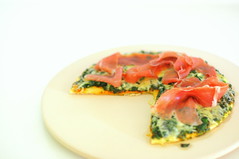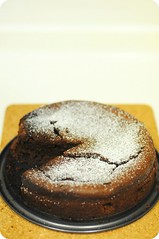Rescue Plans Hit Brick Wall. Israelites Draw Short Straw. (Exodus 5 - 7:7)
Estimating the Platonic Ideal of the Chocolate Cake Taste/Texture** FTW.
Riff on Alice Medrich's Queen of Sheba cake from Bittersweet
70% Valrhona chocolate, coarsely chopped
unsalted butter, cut into pieces
Australian smoked salt
vanilla extract
ground almonds
all-purpose flour
large eggs, separated, at room temperature
light muscovado sugar
lemon
Jewish reference for a Passover-ish meal? Tick. Medrich promised an ugglee cake and it sure was craggy but almost rightly dense and moist inside. But whither Chocolate Cake Taste and Texture Ideal etc?

Suffice to say it embarrassed the lovely dinner that preceded it. Well worth the 1 Michelin star (unauthorised) bestowed by D. I still think fondly of certain truffle-laced raviolis from time to time.
But anyway, we are a way from the first Passover. And not just because of the sake sashimi.
At the close of the last chapter of Exodus (Exodus 4), we were stuck with a reluctant rescuer-designate who was neither keen about rescuing his people from Egypt nor terribly trusting of God's ability to effect such rescue through him.
Anyway, the reluctant rescuer & mouthpiece finally meet with the Pharaoh to present God's demands: "Thus says the LORD, the God of Israel, 'Let my people go, that they may hold a feast to me in the wilderness.'" (Exodus 5:1)
Pharaoh is possibly amused by this challenge to the otherwise perfect obedience to his rule. Afterall, his is current the greatest ruler in the known world, and he and the rest of his world think him a deity too. (And if he was indeed Ramesses II the red-head, the loss of free migrant workers might have interfered annoyingly with his fetish for large scale construction. Plus Freud had not yet been born to distract him with psychoanalysis of his repressed jealousy of his father.)
So he flicks the two Hebrews off with a roll of his kohl-lined eyes:
"Who is the LORD, that I should obey his voice and let Israel go? I do not know the LORD" and "moreover, I will not let Israel go" (Exodus 5:2)
But the Hebrews repeat the demands of the God of the Hebrews and he realises they are quite serious about this rejecting his rule over Israel business. After sending Moses and Aaron away, he decides to show them who really holds their tomorrows in his hands ("thus says the LORD, the God of Israel" (Exodus 5:1) cf "thus says Pharaoh" (Exodus 5:10) ) by decreeing that the slaves would have to meet their daily quota of bricks without a ready supply of raw material for the task (Exodus 5:4-12).
Perhaps Pharaoh thought there was no such god in the first place and so Moses and Aaron's words had been "lying words" (Exodus 5:9). And even if there were such a "God of the Hebrews", he must have been a rather incompetent, lesser god. How powerful could their god be if his people were enslaved by the most powerful empire in the ancient world which Pharaoh was like a god over?
So Pharaoh set himself up against the God of the world.
Meanwhile, God's people unfortunately, buy into Pharaoh's hype. They speak to him as to a god: crying to him for mercy (Exodus 5:15) and grovelling before him, calling themselves "your servants" (Exodus 5:15-16).
So God's own people disowned their God.
And spat upon by the angry foremen, Moses spares no time in accusing God of not keeping his word to them back in the dessert: "O Lord, why have you done evil to this people? Why did you ever send me? For since I came to Pharaoh to speak in your name, he has done evil to this people, and you have not delivered your people at all." (Exodus 5:22)
So Moses the rescuer designate failed to trust the God of the world who'd sent him.***
The megalomanical Pharaoh might be easy to swat off the face of the earth but how can God ever fulfil his covenant promises in the face of a stupid people who trust their abusive captor more than the God who wants to rescue them and how can God do this through the man he promised as rescuer without squishing said rescuer in anger in the meanwhile?
What follows shows that God isn't just a nice Platonic Form of the Personification of the Good. He is a person, a being actively concerned with his world and passionately involved in the lives of his people.
The LORD answers Pharaoh's impertinence:
"Who is the LORD that I should obey him"? Why, this is the LORD who pre-existed the Pharaoh who only recently appeared on the scene. Many generations ago, he had already appeared to Abraham, to Isaac, and to Jacob (Exodus 6:2).
"Morever I will not let Israel go"? Well! God will bring them out from Egypt and deliver them from slavery. He would redeem them with an outstretched arm and great acts of judgement (Exodus 6:5-7)
And the LORD answers the people's unfaithfulness and distrust:
After what I am about to do, you should have no doubt whatsoever who is the God you should put your trust in and whom you should worship.
What food can be found in a desert?Ok, ok. The sandwich or chiasm here tells us the essence of God being "the LORD":
A sandwich.
A - I am the LORD.
B - I appeared to Abraham, to Isaac, and to Jacob, as God Almighty, but by my name the LORD I did not make myself known to them. I also established my covenant with them to give them the land of Canaan, the land in which they lived as sojourners.
C - Moreover, I have heard the groaning of the people of Israel whom the Egyptians hold as slaves, and I have remembered my covenant.
C' - Say therefore to the people of Israel, 'I am the LORD, and I will bring you out from under the burdens of the Egyptians, and I will deliver you from slavery to them, and I will redeem you with an outstretched arm and with great acts of judgment. I will take you to be my people, and I will be your God, and you shall know that I am the LORD your God, who has brought you out from under the burdens of the Egyptians.
B' - I will bring you into the land that I swore to give to Abraham, to Isaac, and to Jacob. I will give it to you for a possession.
A' - I am the LORD.
The essence of God is encapsulated within his covenant with Abraham, Isaac and Jacob. And within that covenant, the meat of the sandwich (C and C'), the central characteristic of God the LORD, would be seen in his rescue of Israel from Egypt - his ability and his willingness to fulfil his promises, his compassion, his power and his judgement.
"Now you shall see what I will do to Pharaoh; for with a strong hand he will send them out, and with a strong hand he will drive them out of his land." (Exodus 6:1) What a promise of exciting things to come. It seems like we're watching the World Cup semi-finals. The camera pans to show the fans in the stands and the field being prepped. Then there's a quick flash away to the background of the more interesting members of the teams about to play. Not a terribly distinguished pair but there you have them. When we return, the banners are out, the field is prepped, the media is waiting, Aslan is on the move (Exodus 6:10-30)... but in the locker room, Moses is still whinging (Exodus 6:12,30).
If Moses was getting nervous about the stakes in God vs Pharaoh - The Showdown, God tells him that actually, the thing is a throwaway. He is complete control over every, that is, every aspect of this situation:
Problem of the reluctant rescuer? "See, I have made you like God to Pharaoh, and your brother Aaron shall be your prophet. You shall speak all that I command you, and your brother Aaron shall tell Pharaoh to let the people of Israel go out of his land." (Exodus 7:1-2)
Problem of the reluctant Pharaoh? Actually, it is God who has hardened/will harden Pharaoh's heart, and though he multiply his signs and wonders in the land of Egypt, Pharaoh will not listen to Moses. Then God will lay his hand on Egypt and bring his hosts, his people the children of Israel, out of the land of Egypt by great acts of judgment. By this the Egyptians would know that he was the LORD. (Exodus 7:3-5)
We humans are fond of claiming the credit for things we have not done. Mark Ashton remind us of the story of the Beaver saying to the Rabbit as they looked up at the Hoover Dam,"No, I didn't actually build it myself, but it is based on an idea of mine". If Moses or the Israelites were to try to claim credit for their salvation after all this was but a distant memory: oh I was obedient, I was. And full of faith too. That's why he chose me/us etc, the Book of Exodus so far just about shoots that out of the sky.
好戏还在后头. Grab some pizza and chips.

spinach and prosciutto di parma pizza. good with Belgian blondes of the drinkable sort
*brick wall pun thanks to D's CLDG entertainment
**for the avoidance of doubt in the minds of the kind folk who have given me much chocolate for which I have been grateful, there is no personal preference for chocolate. It's just the common preference of most folk who eat these confections/conjectures. Artisanal chocolates and otherwise experimenting with chocolate for the sake of it are of much interest however. Attempting not to burn cakes is also of much utilitarian interest.
***and really, this rescue was no skin off his nose really, compared to what Jesus the final rescuer had to go through! Which really brings into focus just how wonderful Jesus' perfect obedience to and trust in God must have been!
Current Read/Think-through of Exodus
- Convalescent Food, Lemon Poppyseed Yoghurt Cakelets and Exodus and the People of God
- Not the Physiology of Taste x Exodus 1
- Moses the Non-Rescuer and Exodus 2 - 4
- Rescue Plans Hit Brick Wall. Israelites Draw Short Straw. (Exodus 5 - 7:7)
- God Shows Hand, Gives Egyptians the Finger (Exodus 7 - 10)
- Easter Bunny Spared, Goose Cooked, Lamb Slaughtered, Israelites Painted Town Red, Dough Failed to Rise to Occasion (Exodus 12)
- Egyptians Sink To New Depths, God Gets Gobs of Glory (Exodus 13-14)
- Hallelujahs for the Hell-bound, Verses for Vengeance, Jumping for Judgement By Beach Boy & Co (Exodus 15:1-21)
Labels: *Exodus, All Given For Food: Bake and Cake, All Given For Food: Chocolate








0 Comments:
Post a Comment
Subscribe to Post Comments [Atom]
<< Home